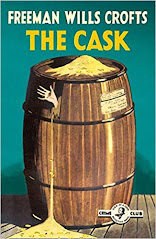Writer employed the intricacies of the railway timetable for his alibis
 |
| Freeman Wills Croft worked in railways for 33 years before becoming a full-time writer |
He wrote more than 30 novels, about 100 short stories, stage and radio plays and some works of non-fiction.
A railway engineer by training, Crofts introduced railway themes into many of his stories and the apparently unbreakable alibis of his characters often featured the intricacies of railway timetables.
He is best remembered for his series detective, Inspector Joseph French, although the character wasn’t introduced until Crofts wrote his fifth book.
His first novel, The Cask, published in 1920, was republished last year to mark its 100th anniversary by Collins Crime Club.
Crofts was born in Dublin in 1879. His father, who was an army doctor, died before his birth. His mother remarried later to a Vicar in County Down and Crofts was brought up at the Vicarage in Gilford, County Down.
 |
| The Collins Crime Club edition of The Cask |
He wrote The Cask after a long absence from work because of illness. He started writing to help him pass the time and it established him as a new master of detective fiction.
In an introduction to the centenary edition of The Cask, Collins reprinted some words Crofts wrote in 1946 about how he began writing the story. He says: ‘I became so bored that I didn’t know what to do and to try to fill the time I asked for a pencil and a few sheets of notepaper. I began to write down what seemed the most absurd and improbable things I could think of.’ When he had finished the first chapter of The Cask he read it to his wife and her enthusiastic approval encouraged him to carry on with the book until he was well enough to return to work.
He continued to write steadily, producing a book almost every year for 30 years as well as numerous short stories.
 |
| Trains and timetables featured in a number of books by Freeman Wills Crofts |
He was a member of the Detection Club with Agatha Christie and Dorothy L Sayers and was also elected a Fellow of the Royal Society of Arts.
Raymond Chandler described Crofts as ‘the soundest builder of them all when he doesn’t get too fancy.’ Crime writing experts have said his concentration on the mechanics of detection made him the forerunner of the police procedural school of crime fiction.
Freeman Wills Crofts died on 11 April, 1957 in Worthing, West Sussex.
The 100th anniversary edition of The Cask can be bought from or
No comments:
Post a Comment